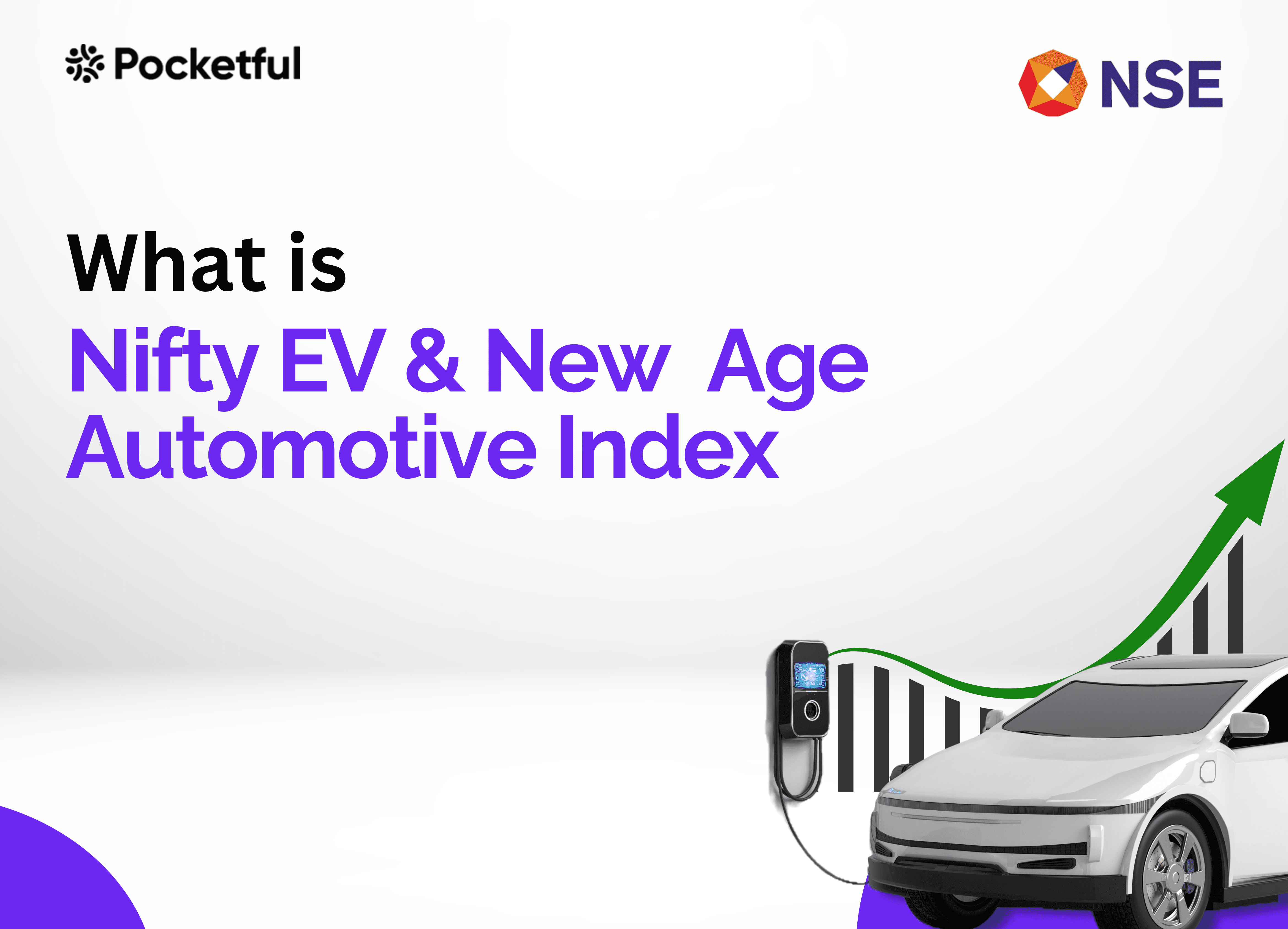| Type | Description | Contributor | Date |
|---|---|---|---|
| Post created | Pocketful Team | Jun-07-24 | |
| Add new links | Nisha | Mar-01-25 |

- Blog
- nifty ev new age automotive index
What is the NIFTY EV & New Age Automotive Index?

There has been a huge increase in the number of Electric vehicles on Indian streets recently. Now, India has its first NIFTY EV and New Age Automotive Index in the stock market!
Today’s blog will explain the purpose of this groundbreaking index and how it benefits investors and the EV industry.
What is the NIFTY EV
The EV Index, also called the NIFTY EV & New Age Automotive Index, is a stock market index introduced in India on May 30, 2024. This is a first-of-its-kind index in India. It monitors the performance of companies involved in the electric vehicle industry or developing new automotive vehicles and related technologies.
The introduction of the NIFTY EV Index is regarded as a favourable development for the EV sector in India. The industry is now expected to see a surge in investor interest, which will undoubtedly significantly boost EV companies.
The base date for the NIFTY EV & Automobile Index is April 2, 2018, with a base value set at 1000. The index will be updated twice a year and adjusted
Reasons for the New Index

There exist multiple rationales for the introduction of a new index tailored specifically to the EV sector. Some of the reasons are listed below.
- Benchmarking: The index can be utilized for various purposes, including benchmarking fund portfolios, launching index funds, ETFs and other structured products.
- Track Performance: The NIFTY EV & New Age Automotive index is designed to monitor the performance of companies operating in the EV and new age automotive sector. This sector includes hybrid vehicles, hydrogen fuel-based vehicles, and green-hybrid vehicles.
- Increased Interest of Investors: The introduction of a new EV index can elevate investor awareness and stimulate increased capital inflows into the EV sector in India. This will benefit both the established EV companies and startups seeking funding for research and development.
Key Points to Note

- Stocks that are part of or soon to be part of the Nifty 500 index at the time of review can be included in the index.
- Stocks in the Nifty 500 can be included in the index if they are involved in the production and supply of electric or new-age automotive vehicles, batteries, components, raw materials, and technology.
- The overall weight of the stocks belonging to Group A (Manufacturing of 2W/3W/4W/PV/CV Electric and New Age automotive vehicles) shall be capped at 40%.
- The weight of each stock belonging to Group A shall be capped at 8%. All other stocks are capped at 4%.
Sector Representation & Current Components
The sector representation in the new index is as follows:
| Sector | Weight |
|---|---|
| Automobile and Auto Components | 72.13 |
| Information Technology | 11.31 |
| Chemicals | 10.63 |
| Capital Goods | 6.39 |
| Oil, Gas & Consumable Fuels | 3.37 |
| Consumer Services | 0.18 |
The top constituents by weightage are as follows.
| Company’s Name | Weight (%) |
|---|---|
| Bajaj Auto Ltd | 7.08 |
| Tata Motors Ltd. | 6.49 |
| Mahindra & Mahindra Ltd. | 5.83 |
| Maruti Suzuki India Ltd. | 5.28 |
| Exide Industries Ltd. | 4.78 |
| Bosch Ltd. | 4.56 |
| Samvardhana Motherson International Ltd. | 4.45 |
| Eicher Motors Ltd. | 4.42 |
| CG Power and Industrial Solutions Ltd. | 4.30 |
| Himadri Speciality Chemical Ltd. | 4.28 |
Read Also: NIFTY Next 50 – Meaning, Types & Features
Market outlook of EV Sector

Industry experts hold both a bullish and bearish outlook for the EV sector. A concise explanation of both viewpoints is provided below:
Bullish Outlook
- Morgan Stanley predicts a 32% growth rate by 2030 for the Indian EV market.
According to Morgan Stanley, India’s increasing demand for cars could account for half of the global car demand in the next two decades. New buyers can skip traditional cars and go straight to modern technology. This means that car manufacturers who are focusing on the future of the automotive industry will likely pursue opportunities for growth in India. - McKinsey estimates that electric vehicles could make up 30% of new car sales in India by 2030.
As per McKinsey, consumers are increasingly showing interest in electric cars. Many people are considering buying electric vehicles for their next car. They prefer full-battery electric vehicles over plug-in hybrid electric vehicles.
The company’s research on electric two-wheelers found that 86% of consumers would consider buying an EV, while only 69% would consider a Combustion Engine vehicle.
Bearish Outlook
- Citigroup has raised concerns regarding the consistency of government policies and the development of charging infrastructure.
- Credit Suisse focuses on the importance of cost competitiveness in EVs compared to traditional vehicles.
- JP Morgan has raised the issue of battery technology advancements and the scalability of sustainable raw materials to meet the growing demand for electric vehicles. This highlights the complex landscape the EV industry must navigate to achieve widespread adoption.
Conclusion
The introduction of the EV index represents a noteworthy milestone for the electric vehicle sector in India. This index has the potential to fuel sustainable growth by providing a clear benchmark and attracting new investments. This index is just the start of an exciting journey towards a cleaner and more sustainable future. However, it is important to consider consulting a financial advisor to determine whether EV-focused investments are compatible with your portfolio objectives.
Frequently Asked Questions (FAQs)
What sectors are included in the EV index?
The index includes the following sectors – Automobile and Auto Components, Information Technology, Chemicals, Capital Goods, Oil, Gas & Consumable Fuels, and Consumer Services.
How is the New EV index beneficial for investors?
Investors can use this index to benchmark their EV investments and gain exposure to the sector through index funds or ETFs.
Is this the first EV Index globally?
There are EV indices in other countries, but this is the first of its kind in India.
How often will the index be reviewed?
The index constituents will be reviewed every six months and rebalanced quarterly.
Is it a good time to invest in EVs?
The EV market is promising and evolving, but consult your financial advisor before making any investment decisions.
Disclaimer
The securities, funds, and strategies discussed in this blog are provided for informational purposes only. They do not represent endorsements or recommendations. Investors should conduct their own research and seek professional advice before making any investment decisions.